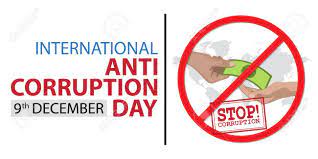World Anti-International Day Against Corruption has been celebrated on December 9 every year since 2005 to raise awareness about global issues.
The United Nations, International Day Against Corruption which officially welcomes World Anti-Corruption Day, says that this political, social, and economic phenomenon is slowing down economic development, undermining the sanctity of democracy and adding to the instability of government.
The UN also cites corruption as one of the “major” obstacles to achieving its 2030 goals. It notes that while corruption exists and affects both rich and poor nations, it is extremely harmful to the poor.

Important Announcement – EasyShiksha has now started Online Internship Program “Ab India Sikhega Ghar Se”

Q. Are EasyShiksha's internships truly free?
Yes, all internships offered by EasyShiksha are completely free of charge.
Q. How can I apply for an internship with EasyShiksha?
You can apply by visiting our website, browsing available internships, and following the application instructions provided.
Q. What types of internships are available through EasyShiksha?
EasyShiksha offers a wide range of internships across technology, business, marketing, healthcare, and more. Opportunities are continuously updated.
Q. Will I receive a certificate upon completing an internship?
Yes, upon successful completion, you will receive a certificate recognizing your participation and achievements.
Q. Are EasyShiksha's internship certificates recognized by universities and employers?
Yes, the certificates are recognized by universities, colleges, and employers worldwide.
Q. Is the download of certificates free or paid?
Access to internships and courses is free, but there is a small fee to download certificates, covering administrative costs.
Q. When can I start the course?
You can choose any course and start immediately without delay.
Q. What are the course and session timings?
These are fully online courses. You can learn at any time and pace. We recommend following a routine, but it depends on your schedule.
Q. What will happen when my course is over?
After completion, you will have lifetime access to the course for future reference.
Q. Can I download the notes and study material?
Yes, you can access and download course materials and have lifetime access for future reference.
Q. What software/tools would be needed for the course?
All necessary software/tools will be shared during the training as needed.
Q. I’m unable to make a payment. What should I do?
Try using a different card or account. If the problem persists, email us at info@easyshiksha.com.
Q. Do I get the certificate in hard copy?
No, only a soft copy is provided, which can be downloaded and printed if required.
Q. The payment got deducted but shows “failed”. What to do?
Technical errors may cause this. The deducted amount will be returned to your account in 7-10 working days.
Q. Payment was successful but dashboard shows ‘Buy Now’?
Sometimes payment reflection is delayed. If it takes longer than 30 minutes, email info@easyshiksha.com with the payment screenshot.
Q. What is the refund policy?
If you face technical issues, you can request a refund. No refunds are issued once the certificate has been generated.
Q. Can I enroll in a single course?
Yes, select the course of interest, fill in the details, make payment, and start learning. You will also earn a certificate.
Q. My questions are not listed above. I need further help.
Contact us at info@easyshiksha.com for further assistance.
Combating Corruption
The World Bank Group sees corruption as a major obstacle in its two goals of eradicating extreme poverty by 2030 and increasing the shared prosperity of the poorest 40 percent of the developing world.
Corruption has an unequal impact on the poor and vulnerable, increasing costs and reducing access to services, including health, education and justice. International Day Against Corruption with the purchase of drugs and medical equipment raises costs and can lead to substandard or dangerous products. The human cost of counterfeit medicines and vaccinations on health outcomes and lifelong impacts on children far outweigh the financial costs. Illegal payments for services can have a negative impact on poor people.
Top Courses in Software Engineering
Royal research has shown that the poor pay a higher percentage of their income by bribery. Some studies have suggested that poor people can benefit because they seem to have less power to complain. Every dollar stolen or misappropriated, the euro, peso, yuan, rupee, or ruble deprives the poor of equal opportunity in life and prevents governments from investing their money.
Corruption erodes trust in government and undermines public order. This is a cause for concern around the world, but especially in times of crisis and violence, as corruption perpetuates and perpetuates inequality and dissatisfaction leading to crisis, violent conflict, and conflict.
Corruption disrupts investment, with consequences for growth and employment. Countries with a high level of corruption use their human and financial resources efficiently, attract more investment, and grow faster.
The World Bank Group recognizes that corruption comes in many forms. It can affect the delivery of services, such as when an officer requests a bribe to perform normal duties. Corruption can misjudge the winners of government contracts, with rewards in favour of friends, relatives, or business associates. Although it may be in the form of state seizures, distorted in how institutions operate and who controls them, a form of corruption that is often more costly in terms of overall economic impact. Each type of corruption is important and tackling it all is essential to achieving progress and sustainable change.
Corrupt interventions often require concerted efforts to overcome captured interests. Openness and open management are often part of the story, but they are rarely the whole story. When deceptive disagreements with corruption and colonialism reach a critical point, the political rewards for dealing with corruption can outweigh the costs of offending interests.
With a lack of reform efforts, progress can be achieved with better and more open processes, professional accountability systems, and the use of the latest technology to capture, analyze, and share information to prevent, detect and prevent corrupt behaviour.
The World Bank Group is implementing new technologies to strengthen public sector performance and productivity, tackling corruption and helping to promote greater trust and accountability, especially in vulnerable areas.
Many of the world’s most expensive forms of corruption would not be possible without institutions in rich countries: private brokerage firms, corrupt financial institutions, and lawyers, banks, and accountants who facilitate corrupt transactions. Global financial data shows that money is moving from poor countries to rich countries in ways that undermine development.
ALSO READ: international-volunteer-day-for-economic-and-social-development
Get Course: Project-Management-for-Beginners







































































